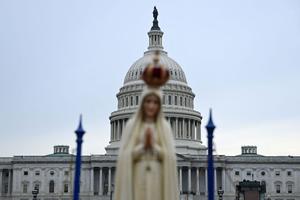Could GOP Tax Reform Put a Dent in Charitable Giving?
The reforms envisioned by President Trump and Congress could have unintended effects on charity.

WASHINGTON — As President Donald Trump and Congress get set to undertake tax reform, some are concerned that Republican tax proposals could lead to drastic reductions in charitable giving.
“I don’t think that it was intended, by any means, that they want to harm charitable giving,” Brian Walsh, executive director of the Faith & Giving Coalition, told CNA of research that claims GOP tax reform proposals could give Americans less incentive to make tax-deductible charitable donations. Religious charitable groups like Catholic Charities, USA are coalition members.
Yet, he added, “unintended consequences can be just as damaging as those that are intended.”
Walsh referred to two Republican tax proposals for his claim: Trump’s proposal released in April, and another “blueprint” by House Republicans last summer.
Both feature two policies, doubling the standard deduction and decreasing the highest marginal tax rate from 39.6% to 35%.
Taken together, these “would decrease charitable giving, including giving to religious institutions, by as much as $13.1 billion (4.6%),” research by the Independent Sector predicted.
One reason why this might be, the report explained, is that most Americans use the standard deduction on their taxes because it usually offers them a better rate of return than itemizing their deductions. Charitable giving, if written off on one’s taxes, is part of the itemized deductions.
If the standard deduction is doubled, therefore, even more Americans would take advantage of it and fewer taxpayers would choose to itemize their deductions. This could disincentivize charitable giving.
Religious organizations could see the highest drop in charitable giving under these proposals, the research claimed, as much as a 4.7% decrease.
“There remains on Capitol Hill some fuzzy assumptions that religious givers don’t pay any attention to their tax bills,” Walsh explained, adding that “if they have the ability to give more, and the tax code allows them to do so, they’re likely to do so.”
Doubling the standard deduction could bring economic relief to households, The Faith & Giving Coalition concedes. So rather than simply scrapping the proposals, the President and Congress could instead extend charitable tax deductions to everyone, and not just “itemizers.”
That, the report added, “erases that $13.1 billion deficit,” and could actually increase charitable giving by as much as $5 billion.
This could decrease tax revenue, Walsh admitted, but in his estimate the change would be small, less than one percent.
Such a policy would be fairer, he said, than the proposed one, because it would enable more lower-income households to make charitable donations.
“Those who tend to be in the lower to lower-middle income classes who don’t itemize today, they right now don’t get any tax relief for their charitable deductions,” he said. Expanding the charitable deduction to everyone would help lower-income households “get the same tax relief for their charitable deductions that people who are in the higher income brackets get.”
And this scenario is advantageous, he argued, because charities do the best work of serving the poor and taxpayers are further empowered to reward those which do the best job.
“The money remains in the hands of individuals who can determine who’s doing the best job providing services to the impoverished, the homeless, and other needy people,” Walsh explained.
- Keywords:
- congress
- gop
- tax reform
- trump

















